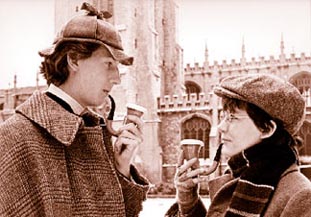Hidden Gem: Young Sherlock Holmes
By Stephanie Star Smith
September 20, 2004
BoxOfficeProphets.com

Sherlock Holmes and Dr Watson arrived fully realized when A Study in Scarlett appeared in Beeton's Christmas Annual in 1887. But how did this singular person come to be? What forces led Sherlock Holmes to basically create a hitherto-unknown profession for himself, investigating crimes and assisting the people whom the police cannot, or will not, help? Nicholas Meyers' wonderful book The Seven Percent Solution addressed these questions in part, but the book, later made into a film unworthy of its source material, focused on the great detective as an adult.
But what about Sherlock Holmes the boy? What was he like?
This is the premise of the undeservedly-overlooked film Young Sherlock Holmes. The film finds the teenage Holmes already honing his skills at observation and deduction at boarding school. Here he meets the teenage Watson, and the two form the friendship that will be the basis of their partnership in adulthood. That budding relationship is strengthened when they are drawn into the mystery surrounding the sudden deaths of several prominent citizens, all of whom seemed to go insane just before their untimely demises. The police naturally believe the deaths to be unrelated, but our young sleuth sees patterns the police cannot, so the nascent detective and the doctor-to-be work together to try and determine exactly what is happening and why, so they can hopefully stop the killer before he strikes again.
Young Sherlock Holmes works on two levels. It works first and foremost as a top-drawer mystery, so audiences whose only knowledge of Sherlock Holmes is viewing one of the 4,732 filmed versions of The Hound of the Baskervilles will still be entertained. Indeed, the film packs enough intrigue, suspense and exciting action sequences to make Indiana Jones envious, no surprise given that it was produced by Amblin Entertainment.
But if you're familiar with Conan Doyle's tales of the Great Detective...oh, the rare treats that are in store for you. A pre-Harry Potter Chris Columbus does an excellent job of demonstrating many of the traits we have come to recognize as the hallmarks of Conan Doyle's creation, and he even manages to throw in a couple of surprises that help to explain some of the qualities we see in Holmes the adult. And the other little character touches that embroider the film help to set up the universe we recognize from the Canon, and in a way that seems neither contrived nor horribly obvious.
Of course, as with any mystery, to reveal anything about the plot would be a crime in itself, nor would it do to reveal much about any of the other characters in the film besides the Great Detective and his Boswell. But certainly one of the intriguing elements in the film is how it introduces characters that have nothing to do with the Canon, but who, in many ways, affect the young Holmes and place him on his path with destiny.
The acting is uniformly excellent, though you'll not recognize any of the names, and the two young gentlemen who portray the all-important roles of Holmes and Watson, Nicholas Rowe and Alan Cox, respectively, embody the parts as though each was written specifically for him. The special effects by ILM, which were revolutionary for their time, also still hold up fairly well even in this seen-it-all, CGI-savvy moviegoing age.
But certainly one of the best things about this hidden gem is the performance of Rowe. Sherlock Holmes is not an easy role to essay; he must command your attention without demanding it, a subtle difference often lost on the Great Detective's portrayers. There is a charisma about the man, a quiet confidence and an aura of keen wit and intelligence that never crosses over into complete arrogance that is difficult to render. And if you think it's easy to play a character who is cold, analytical and keeps his emotions under control without being boring, flat, making you want to punch him in the face or completely missing the "emotions under control" portion of the program, check out the portrayal of any Vulcan in the Star Trek franchise save Leonard Nimoy, Mark Lenard and Gary Graham and you'll see what I mean. But Rowe manages to accomplish all of this in but his second film appearance; not an easy feat to be sure at twice the 19 years Rowe had attained at the time. He certainly stands with Jeremy Brett as a worthy rival to the great Basil Rathbone as the best portrayer of Holmes.
You do not need to be an expert on Conan Doyle's tales to enjoy Young Sherlock Holmes. It will satisfy not only fans of mysteries, but fans of action/adventure flicks as well. And for the Sherlockians in the audience, Young Sherlock Holmes provides another take on the master sleuth as a young man, and the grace notes will delight and surprise.
Oh, and if you're one of those people who never sits through the credits, do yourself a favor this one time and wait till the roll has completed; I guarantee you'll be rewarded.